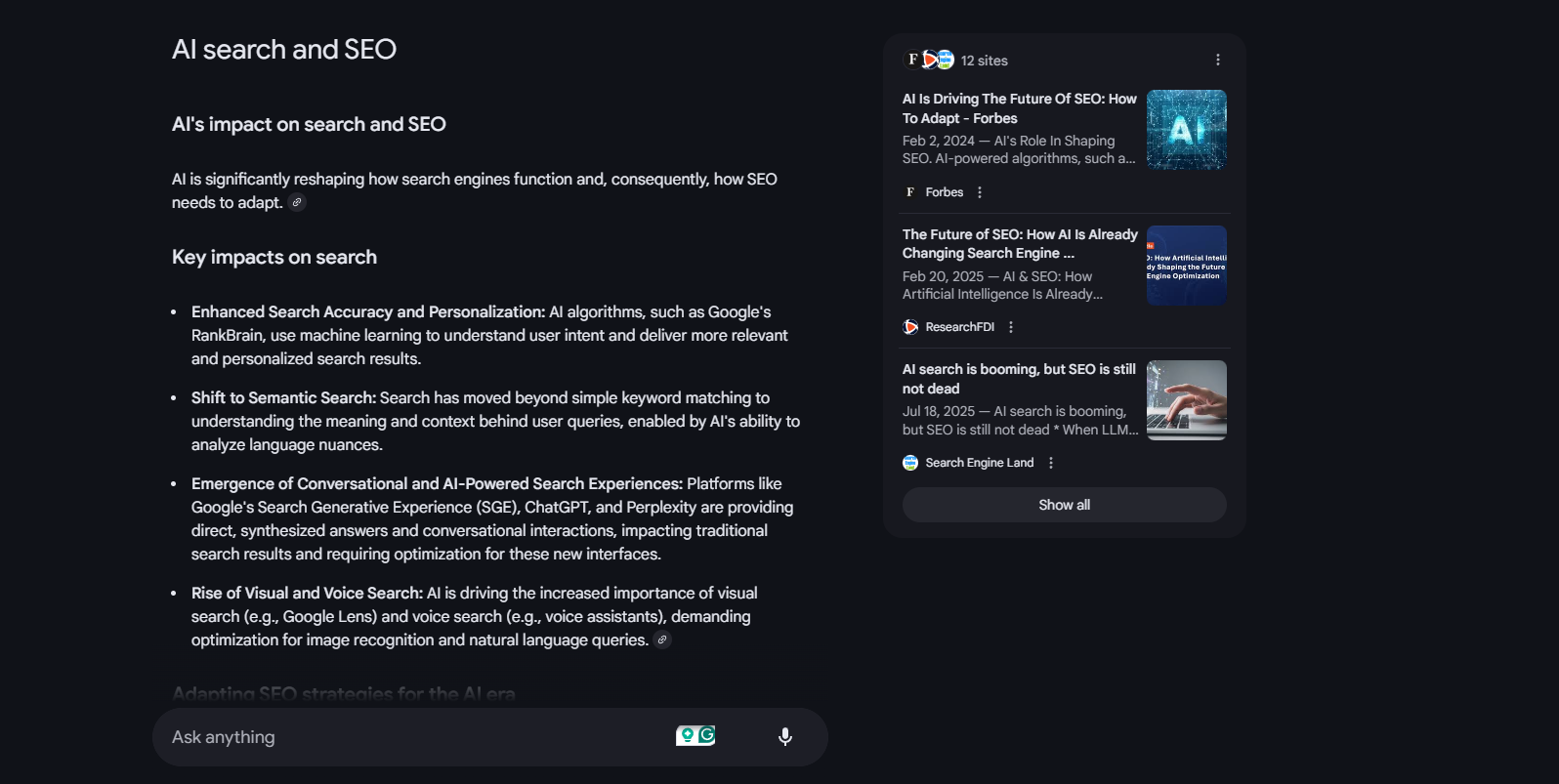AI search is challenging traditional SEO strategies as users have new ways to receive answers to their queries. There are AI-driven search technologies like Google’s AI overviews, and queries made on LLM platforms like ChatGPT and Grok. AI does not follow traditional SEO strategies. It does not put the same weight on keyword optimization, backlinking, and a flashy title. AI prioritizes user intent and article context, reducing CTR as more people get the answers they need without any additional clicks. To maintain visibility and rankings in 2025, businesses must adapt their SEO practices to keep pace with the evolving algorithms.
We’re going to answer all your questions about what AI search means for your SEO strategy — brought to you by a team with decades of experience in the digital world.
Here’s a sneak peek at what’s on the docket:
- How to rank in an AI-driven search
- What kinds of content drive priority in AI search engines
- User experience in web and mobile page layout
Understanding AI Search and Its Impact on SEO
AI search leverages advanced algorithms to interpret user queries, delivering context-aware results that often bypass traditional keyword matching. Unlike conventional search, which relies heavily on exact keyword matches, AI search prioritizes intent. Semrush has coined this generative engine optimization, which is the practice of creating content optimized for AI-generated answers.
This affects traditional SEO, shifting the focus to quality information and a thorough exploration of the topic. Alongside this, the “AI overview” feature stops users on the search page, providing them with the necessary information without requiring any further clicks. That overview, however, opens the door to the websites referenced in the window as solid sources for more information.

This shift has significant implications for SEO. Throughout the 2024 calendar year, organic CTR declined by over 50%, indicating the increasing effectiveness of AI-generated overviews in providing sufficient information to answer user questions. One query into Google is all it takes. This increases the competition businesses face for visibility in SERPs.
AI overview and queries are a new source for referrals. They draw from a wide range of multimedia content, emphasizing the importance of cross-platform posting to stay ahead in search results.
Challenges include:
- Reduced click-through rates as AI provides instant answers.
- Greater emphasis on appearing in AI-generated results, such as featured snippets.
- The need for content that aligns with user intent and contextual relevance.
To address these challenges, businesses must optimize their websites to align with AI search priorities while maintaining a user-centric approach. This introduces several new ways to track content visibility and impressions, but a solid foundation in SEO remains valuable.
Strategies to Optimize Content for AI Search

Focus on User Intent
AI search engines prioritize content that directly addresses user queries. To rank effectively, content must provide clear and precise answers to user queries. This means the FAQ sections remain very valuable. These sections target high-intent queries, such as “How to optimize a website for AI search,” which improves visibility. These pages should use clear, concise language and anticipate user needs, ensuring alignment with AI’s intent-driven algorithms.
Leverage Structured Data
Structured data, such as schema markup, helps AI search engines understand content context, increasing the likelihood of appearing in featured snippets or AI-generated answers. Implementing schema types like FAQPage, HowTo, or Article also enhances visibility. There are tools like Schema.org that facilitate the use of schemas throughout a website.
Businesses should prioritize schema implementation to provide AI with clear signals about the relevance of content.
Optimize for Voice Search
AI search powers voice assistants like Google Assistant and Alexa, which favor conversational, long-tail queries. Optimizing for voice search involves targeting phrases users might speak, such as “What are the best SEO tools for small businesses in 2025?” Content should incorporate natural language and question-based keywords to capture these queries. This approach ensures compatibility with the growing prevalence of voice-driven searches.
Even outside of voice search, long-tail keywords are a powerful choice for changing SEO strategy. People are more likely to use long-tail conversational keywords when querying AI, as evidenced by the millions of dollars spent on phrases like ‘please’ and ‘thank you’ to ChatGPT.
Structuring Content for AI Relevance

Create Comprehensive Pillar Content
Build a hub of strong, useful content that’s interlinked with a hub page that creates an overview of the topic. It remains beneficial to create a wide base of content across various platforms. With the way AI searches content, now mentions are incredibly significant, not just backlinks.
Discussion surrounding a product or business is checked by a generative search. This opens the opportunity to use forums like Reddit and Stack Exchange to foster discussion of your product or service. As long as the content is genuinely helpful, it provides a boon to AI-search relevance and increases the chance of the conversation continuing with mentions galore.
AI search favors in-depth, authoritative content that thoroughly covers a topic. Pillar content serves as a central hub for broad topics, linking to related cluster content for more specific subtopics. For example, a pillar page on “SEO Tools” could link to cluster pages on “Keyword Research Tools” and “Analytics Platforms.” This structure establishes topical authority, making it easier for AI to recognize and rank content.
Improve Content Scannability
Outside of a tool like Schema, a well-designed page is good for both users and AI. Use formatting like:
- Bulleted lists
- Short paragraphs
- Clear H2 and H3 subheadings
- Structured formats
It is easier for AI to extract the information from short paragraphs that examine one big idea than longer, more detailed blocks of text. Keep the details and information, but format it so that there are plenty of natural breaks in the text. Users like that too!
Update Content Regularly
Freshness is a critical factor in AI search rankings. Regularly updating high-performing pages with current data, trends, or 2025-specific insights ensures continued relevance. A slow-rolling update push is the perfect time to change your SEO strategy to keep AI-searches and LLM queries at the top of your list. There are many impressions awaiting websites that are on the cutting edge of generative engine optimization.
When working with AI searches, we recommend taking time to query AI about the questions you are trying to solve. Just like searching Google for potential keywords, type in keyphrases into ChatGPT and Google’s AI search to see what results appear, and how the AI displays that information.

The Cost of Ignoring AI Search
Failing to adapt to AI search can result in significant losses:
- Reduced Visibility: Relying on outdated keyword-stuffing tactics diminishes rankings as AI prioritizes intent-driven content.
- Lower Conversions: Fewer clicks from AI-generated summaries reduce opportunities for sign-ups or purchases.
- Increased Marketing Costs: Poor organic performance necessitates higher spending on paid advertising to maintain visibility.
A 2023 Nielsen Norman Group study estimated that ineffective digital strategies, including poor SEO adaptation, cost businesses billions annually in lost productivity and conversions. While the items to optimize are changing, the market continues to grow.
Your AI Search SEO Checklist
To optimize for AI search and maintain competitiveness in 2025, implement these strategies:
- Target user intent with question-based, concise content.
- Implement structured data to enhance visibility in AI-generated results.
- Create and link to pillar content to establish topical authority.
- Optimize for voice search with conversational, long-tail keywords.
- Prioritize page speed and mobile-first design.
- Update content regularly to maintain relevance.
What does AI search mean for your SEO strategy?
Adapting SEO strategies for AI search is critical to maintaining visibility and driving organic traffic in 2025. Businesses can align with AI-driven algorithms and stay competitive by focusing on user intent, leveraging structured data, and structuring content effectively.
While investigating new SEO and GEO strategies, play around with AI searches. Switch up the questions asked and see how the positions shift on the top results. Look up your own company, as well, and see what AI has to say. It is of the utmost importance to cultivate a positive standing with AI searches, as they will avoid your site if they believe the information is not reputable. Look into the competition and see how they rank in the eyes of the AIs.
Woodside Ventures specializes in solving complex e-commerce and marketing problems across competitive industries. If your information architecture needs an overhaul, drop us a line. We’re happy to help you decrease the crawl depth of your important pages and give your SEO a permanent boost.



